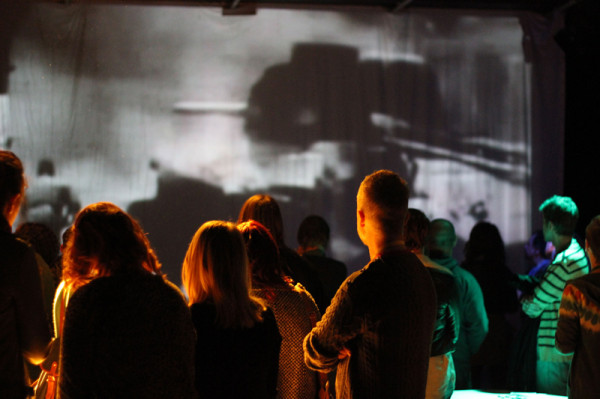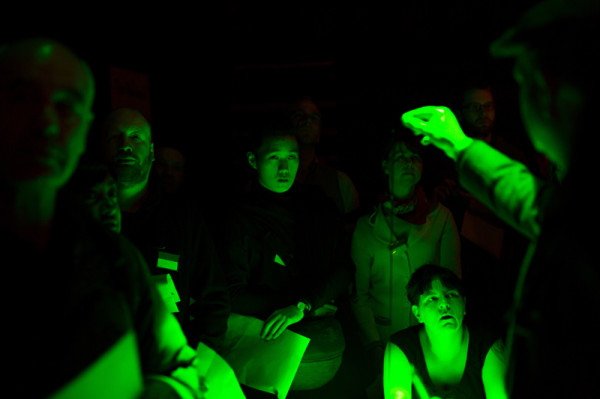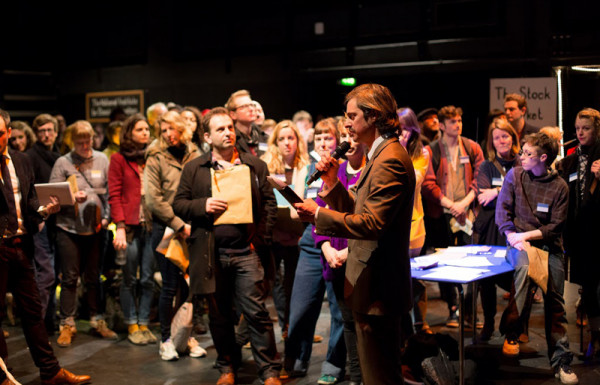Dacia, our ancient nation, is on the verge of collapse. 60 audience members, gathered in a theatre, are challenged to rebuild it. But, from the very beginning, we are divided. 20 of us are Islanders, 20 from The Plains and 20 from the City. Each area has different personalities, priorities, and each area is given different information.
In the spirit of Early Days, this is a participatory review. I spoke to audience members from each of the 3 areas to find out what they thought about the show.
——————————-
How did you hear about Early Days?
I live around here, and I’m really into politics so I was curious to see how the politics of a nation could be represented in a piece of theatre.
Which area were you put into?
The Plains.
Were you happy with the group you ended up in?
We lived up to our name. Didn’t rock the boat too much. There were some cool people in the group – I don’t know whether Coney had any system for dividing us or whether it was just random. A woman defected to us from the Islanders, so we were clearly happier with the group we got than she was. Another I spoke to afterward had wanted to defect but was too curious to see what happened to his group to leave.
What political system did you vote for and why?
Personally, or what system did my group vote for? I went for democracy obviously. Not only because that’s what I believe, but also because I thought it would give the show the most interesting narrative. I think about 50/50 from the Plains went for either democracy or no political system at all. But people were engaging with it on different levels, so some were following their beliefs and some were playing it as a game.
What did you think of the structure of the show?
I think Coney quite calculatedly built division and suspicion into the proceedings. They drip-fed information, and different bits to different groups.
On a literal level, there was all this ridiculous talk about circles and chairs, mainly from the Islanders who must have been prepped to be disruptive. They were insisting that the three groups couldn’t talk properly sitting in blocks and wanted to move the chairs into a circle. It was a complete waste of time – just diverting the focus onto something utterly pointless. Like, almost literally rearranging the deck chairs on the Titanic.
There was a nice touch that the guy playing the newsreader prowled around and repeated our own quotes to us – giving these mid-narrative summaries. It was good to see that theatricality was secondary. There were these maps, national anthem, videos and they were really well made, but they weren’t the focus. The politics was the focus.
The game got quite heated towards the end, some people seemed to be genuinely angry. What did you make of that?
It’s about politics – how can you not make it personal? How can you not take it seriously?
What was it like to play the game with people you’d never met before?
Oh, stop calling it a game. It demeans the process. It was trying to say something serious. Ok, it would have been nice to have some political scientists to provide a bit of insight and to temper the angry voices, but most people had genuinely interesting and insightful and heartfelt things to say. The plurality of voices mattered. It meant that when someone gave their opinion, claiming they’d solved everything, there was always someone to offer a rebuttal and explain why there was another point of view. That’s what politics should be, it should build in the necessity of different opinions and the chance to air them.

Photo: Coney.
Would it ever have been possible to rebuild Dacia in a satisfactory way?
Probably not, just from the way Coney structured it. It was really interesting to see that instinct seemed to push everyone – despite their differences – towards a utilitarian solution. So everyone was keen to allocate their resources for the common good, even though that sentiment actually just broke down. Maybe that says more about the calibre of audience members for a piece of interactive theatre than it does about humanity generally but, still, it was nice.
Did you leave the ga-, sorry, did you leave the show having changed your mind about any political issue?
Not really. Everyone went in with different opinions, and everyone left with different opinions. The loud people had a chance to broadcast them to a room of 60 strangers. I think it had more to say about the workability of participatory theatre. As a concept Early Days had a lot to say about political systems and as an analogy it worked really well. But when people try to expose cracks in it, when they treat it like a game, then it starts to fall apart. Still, you can’t force people to take it seriously. That negates the point of a show that’s about everyone’s individuality, that’s about the fact that no two people, or no 60 people, believe exactly the same things.
——————————-
How did you hear about Early Days?
A friend told me about it. Sounded fun.
Which area were you put into?
Islanders.
Were you happy with the group you ended up in?
Er, happy? No not really. But it was the only interesting group to be in.
What political system did you vote for and why?
I voted for no political system. As in, I voted for not having a political system.
What did you think of the structure of the show?
Didn’t allow for freedom of expression. Didn’t allow individuality. You’ve got to push it, see how much it can take. Watch it snap. It’s no fun otherwise.
The game got quite heated towards the end, some people seemed to be genuinely angry. What did you make of that?
People just resorted to that Question Time bullshit – angry rhetoric that doesn’t actually mean anything. ‘All politicians are shit, all governments are corrupt’ ok fine be angry but what does that actually mean? I can walk down a clean street to a reasonably priced piece of theatre, get a train back at midnight to my comfortable secure home. I’m frustrated, everyone’s fucking frustrated with this government but just think it through. Don’t be all Russell Brand empty fucking vessel about it. You know, everyone agrees that David Cameron is a bit cuntish, but he’d have to be insanely inept to fuck the country up in any meaningful way. Be angry, be furious, be whatever the fuck you want to be. But this is a piece of theatre. It’s not going to change the world. So why not have fun? Why not break the rules a bit?

Photo: Paul Blakemore.
What was it like to play the game with people you’d never met before?
I dunno. Most of them were ok. Some were complete pricks. People kept trying to take control, to be leaders but our group wouldn’t allow them. One poor cow almost made it. She said the right things and led us along, and we almost didn’t notice it was happening, but she started to be too loud and as soon as she started trying to engage with the other groups, even though she was making the same point as them, she was shouted down and vilified by them. And there we all were, the Islanders, breaking the rules and just getting away with it.
Would it ever have been possible to rebuild Dacia in a satisfactory way?
How do I know? I didn’t make the show, I just tried to destroy it. Who are you anyway? Why are you asking all these questions?
Did you leave the game having changed your-
Can you shut the fuck up already?
Did you leave the game having ch-
FUCK OFF!!!
Did you- oh, he’s gone.
——————————-
How did you hear about Early Days?
I’d heard of Coney and I go to the theatre a lot but I haven’t really been to a participatory show before and this seemed like something that would interest me.
Which area were you put into?
I was put into the City. In the bar before the show started me and my friends were a bit confused as to what these little postcards meant, ‘Greetings from the Islands’ and stuff. But then they said ‘if you’ve got a City postcard go into this area, if you’ve got a Plains one go over there’ and so on. So we went off into our group and they showed us this video about the history of Dacia and gave us a little bit of information before we went into the central Council Chamber to meet the other groups.
Were you happy with the group you ended up in?
Yeah, I was actually. There were some really friendly people in the group and we were all quite organised, so we could have won really easily. It was basically the Islanders who made us lose – I have no idea what was going on with them. They seemed really chaotic. But my group were all broadly on the same page, we worked well together.
What political system did you vote for and why?
I voted for a democracy, so some kind of system of representation. I mean, then we actually had to decide what that system would be but it was pretty obvious that there would be like MPs, representatives from each group. I volunteered to be one. Only one guy voted for a dictator, but I have no idea why anyone would not want a democratic system. Loads of people – mostly Islanders I reckon – decided not to have a political system at all. So basically anarchy. I think they decided that they each wanted to represent themselves. So while we and the Plains people had 3 representatives each, the Islanders couldn’t really take part in the game in the same way because they had no cohesion.
They created a paradox: if everyone represents themselves in any way they want, then anyone can represent himself as the representative of all of them. Besides, they resorted to a democratic vote at the end anyway when they voted to go independent.

Photo: Paul Blakemore.
What did you think of the structure of the show?
It would have worked really well if people hadn’t been deliberately trying to disrupt it and break the rules. It actually had this really nice three-act structure, beginning with talking to the three groups individually, then bringing them together to vote on a political system, then an interval and finally working out how to allocate resources to save the nation.
And everything was strung together by a newsreader. Towards the end he was talking to us individually and then giving news reports. An islander ended up shouting in his face. I suppose he reflected the role of the media in politics – feeding information, playing to different agendas.
The game got quite heated towards the end, some people seemed to be genuinely angry. What did you make of that?
It’s only a game. There are rules, and you obey them. It’s a useful analogy for the real world, but it isn’t the real world. Because other people didn’t obey the rules it meant that we couldn’t win. We should have made the Islanders have a democracy. That was it, that was the moment where we failed – from then on, it was impossible for us to win. We should have just made them.
What was it like to play the game with people you’d never met before?
Everyone was playing to different degrees, forcing different responses from others. So, most people just naturally want to play by the rules, but some people took it too seriously and some not seriously enough. And those different reactions made other people either follow them or push away from them, so you get this really wide range of ways to participate.
Would it ever have been possible to rebuild Dacia in a satisfactory way?
Yeah I think it would, if we had made the Islanders have a democracy, made them choose 3 representatives. Then you’ve got 3 from each group, and 9 people can make decisions efficiently. 60 people can’t. It’s just impossible. Thinking about it, there was this really specific moment where we failed and from then on we couldn’t rebuild Dacia.
Did you leave the game having changed your mind about any political issue?
I suppose it made me realise that a small number of people representing a large number of people is the only workable way to run things. There isn’t room for anarchy or communism in a society. There need to be rules and, as long as people follow them, everyone’s going to be happy.

